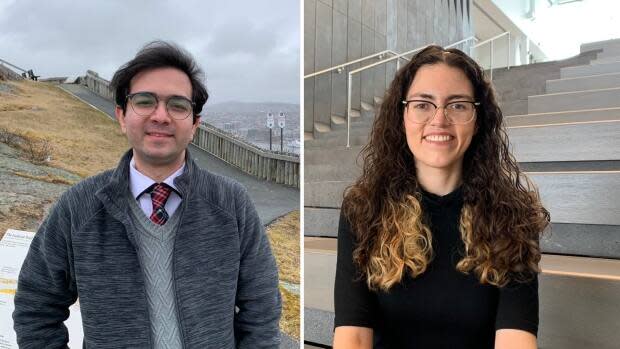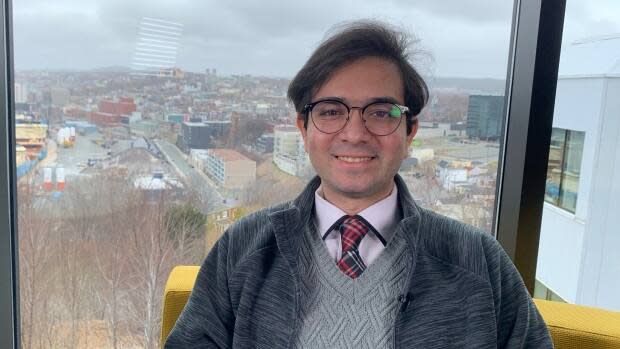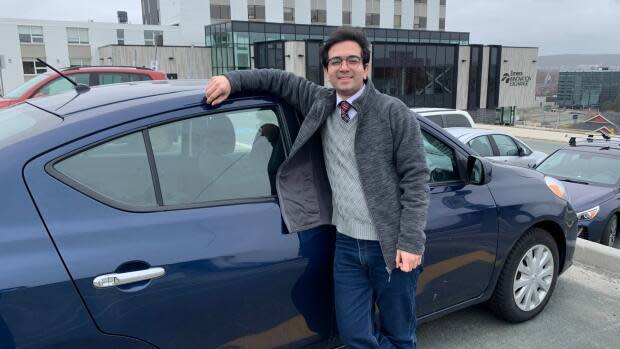International students find shelter from pandemic storm on Signal Hill

Mariana Esquivel Suarez and Saman Bazmi both came to Memorial University for an education. They never imagined they would find safe harbour from a raging global pandemic.
Suarez said she's "really thankful" to be in St. John's during the COVID-19 pandemic.
"When I compare it to the experience of my parents, or like even the families of other friends who come from other countries, the pandemic here, we've been so lucky," she said.
Suarez is from Mexico City, and Bazmi is from Tehran. They came to Memorial as graduate students; Suarez has just completed a master's in folklore, and Bazmi is pursuing a PhD in computational biophysics. Both are living and working as residence co-ordinators at the university's Signal Hill campus, a converted hotel that overlooks St. John's harbour from a perch near the top of Signal Hill. When they look out the window, Cabot Tower looms in one direction, the jellybean colours of downtown St. John's houses in the other.

It's a magnificent view, but also an ever-present reminder of just how far they are from home.
"Any kind of immigration, either academic or for work, you are far from our family and far from the home that you are growing up," said Bazmi. "I am the first kid in my home. It was really hard for me, and especially for my parents, far from each other."
In March 2020, the distance between these students and their families suddenly seemed to grow even larger. With many countries closing their borders and international travel shutting down, Bazmi and Suarez found themselves facing a stark choice: to go home and be with their families, or to stay and ride out the pandemic on Signal Hill.
To hear Suarez and Bazmi share their story in their own words, click the video below.
Should I stay or should I go?
When Memorial University announced it was closing its main campus and shifting classes online, Bazmi scrambled to clear out his office and bring everything back to his room. He soon realized that things inside his residence were about to change too.
"The first thing that we had was closing the kitchen," said Bazmi. "Consider, you bring everything from your office to Signal Hill campus and you see the email that says 'your kitchen is going to be closed in two days.' I remember in that two days, I cook everything that I had food for one month."
The university gave the students an allowance for takeout meals, and made an exception to a rule forbidding cooking appliances in residents' rooms. Suarez figured out how to make hot meals with just a kettle.
"I was heating everything up in hot water baths," she said. "So I had to get really creative, and it was fun… I think I can think of it as fun now."

But the international students had bigger problems on their plates. News reports about other universities closing their residences and sending international students home reverberated through their social circles. Some countries announced border closures and sent flights to pick up citizens abroad. And with the pandemic spreading, many worried about what would happen if loved ones back home got sick while they were stuck half a world away.
"It was really stressful at times. I didn't know what to do, as I think most of us international students didn't know what to do," said Suarez.
Suarez wasn't dealing with only her personal stress. In her role as a residence co-ordinator, other international students were coming to her, worried they would soon be kicked out.
But that didn't happen. Instead, Suarez, Bazmi, and the other student residents were allowed to stay. They've been living at the Signal Hill campus and continuing their studies ever since.
"I was just so grateful that the residence did not shut down, especially because many of us come from countries where the pandemic hasn't been handled great," said Suarez.
The Tiger of Newfoundland
After deciding to stay, Bazmi began to navigate residence life under COVID-19.
For 32 days, he didn't leave the campus, he said. He spent much of that time on video calls from family and friends. He set up a tiny home office in the corner of his room, and worked away on his degree. But he soon began feeling cooped up in his home on top of a hill, especially when the campus shuttle bus service shut down.
"When you are in the Signal Hill campus, you need shuttle bus, because of the slope of Signal Hill Road," said Bazmi. "When the shuttle cancelled, I said, 'What should I do now? I cannot do anything.'"
When summer rolled around, Bazmi decided to dig into his savings account and buy his first car — a Versa Nissan he christened "the Tiger of Newfoundland."

The Tiger changed Bazmi's whole lifestyle. After months stuck in one place, he was suddenly free to get out and explore. He hit the road and visited many of eastern Newfoundland's most scenic spots, from Cape Spear to the bridge in Lamanche Park, and notched more than 200 kilometres hiking.
Despite the challenges they had after the shuttle bus was cancelled and the kitchens were closed, Bazmi and Suarez applaud Memorial University for every step it took.
"All of these decisions is for our safety," said Bazmi, adding he thinks Memorial University is one of the best places in Canada. "I am very grateful to the Memorial University of Newfoundland, especially the Signal Hill campus, because they are keeping us safe, and that is so important to us."
With the semester winding down, Suarez has completed her master's thesis and is nearing the end of her time at Memorial University. She says the pandemic didn't cast a shadow on her time here. In fact it may have made it shine brighter.
"Even with the pandemic, I would say this was a great experience for me. And I am so grateful to everyone I met here, to the university and just to the province in general."


